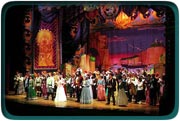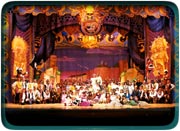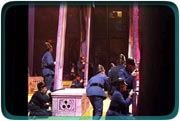The Savoy Company celebrates 100 years of taking on Gilbert and Sullivan.
There’s a story some members of Philadelphia’s Savoy Company like to tell, more often somberly than with a smirk. Up until 10 years ago, in an almost bacchanalian climax to their annual season of Gilbert and Sullivan productions, they would burn their sets: all the painted backdrops, all the set pieces, would go up in smoke after their last show of the summer at Longwood Gardens. The memory of it clearly tests Mike Wittich, president of the company which celebrates its centenary during this, maybe its toughest season. He notes, dryly, “Any company has its ups and downs, particularly over a hundred-year period.”
In May, the Continental Business Center in Bridgeport, Pa., burned to the ground. Inside, at the generous consent of the owner, Savoy, the oldest amateur G&S company in the world, had stored all of its sets from the last 10 years, when, according to Wittich, the members “got a little more intelligent” and began to save them for reuse, rather than send them to the pyre. After all, he explains, there are only 13 G&S shows in existence, which the company cycles through regularly: “These were pieces we used and used again.”
The loss was immense; everything from real-hair wigs, which, says Hillary Wittich, Mike’s wife and a Backstager who helped take inventory of the damage, are quite rare nowadays, to all-purpose furniture, to a full mast and rigging which would have served for HMS Pinafore indefinitely: All exist now only in photos. But the real challenge to the company in the fire’s wake was a matter of pride. It would have to find a way to make its centenary celebrations as enthusiastically memorable as the preceding 100 years, which intertwine with the history of G&S in the United States.

The Savoy Company was born when trans-Atlantic fever for the works of W.S. Gilbert and Arthur Sullivan, late 19th-century British collaborators who created some of the most famous comic operas ever written, was reaching its first peak; founded by Alfred Reginald Allen, his sister Anne and their friend Maria Scott Beale, its first performance was in Merion Cricket Club, and when the group formally became a society in September 1901, its mission was to counteract the growing number of bizarre treatments of G&S works appearing in the U.S. by focusing on the “original” English staging. Though the founders never recorded exactly what unsavory adaptations they had seen, Mike Wittich believes corrupted versions of the shows were being brought over to America from London at the time, the lyrics and music having been “copied” down in a dark auditorium.
While purveyors of hacked-up G&S were weeded out, the Savoy was feted. Its traditional approach is upheld to this day — usually, say the performers, by careful selection of directors and scrupulous attention to the detail of what they call the “great music and wonderful humor” of each show. They still possess a letter dated June 15, 1904, in which W.S. Gilbert writes to the first president of how it is “gratifying” to know that a company in Philadelphia takes such interest in the “joint works of Sir Arthur and myself.”
It is now apparent that the popularity of G&S in Philadelphia was underestimated even by Sir Gilbert; Savoy has about a thousand members throughout the world, and has even found a fan in Peter Lane, executive director of the Mann Center. As the Mann started to broaden its focus a few years ago, with the advent of other large pop venues such as the Tweeter Center, Mike Wittich remembers Lane approaching the society, suggesting that they move their annual city concerts from the Academy of Music to the Mann. At the time, says Wittich, they decided to hang on to history (the Savoy is the fourth-longest tenant at the Academy, performing there since 1926, beaten only by the Philadelphia Orchestra, the Orpheus Club, where they currently rehearse, and UPenn graduations); yet, as the society is having to move its forthcoming season next door to the Merriam while the Academy undergoes construction, they accepted the Mann’s offer to host the gala concert, featuring excerpts from the most prominent — and popular — works.

For an amateur group, consideration of what is popular has become more significant in recent years. Wittich envisions the possibility that the society will perhaps start cycling in the more popular shows — The Mikado, The Pirates of Penzance and HMS Pinafore— more often. As president, he says he feels torn: “Part of our mission, as we see it, is educational, getting those lesser-known shows out there, but the more money we make, the more we can give to charity.” The Savoy has long donated profits, after covering production costs, to causes chosen by the collective.
In choosing to stage a celebratory G&S show, picking out the highlights, the board also settled on an influential director. Through Belinda Tyler, one of the producers, who was involved in the Gilbert and Sullivan festival in Buxton, England, before she arrived in the U.S., the Savoy attracted Cynthia Morey; her career began with the D’Oyly Carte Opera Company (originally formed by Gilbert and Sullivan’s producer, Richard D’Oyly Carte, and housed in the purpose-built Savoy Theatre in London), where she rose to leading soprano, before joining Sadler’s Wells Opera as principal mezzo. She says she relished the chance to visit Philadelphia, as she did before with the D’Oyly Carte, playing Yum-Yum in The Mikado: “I’ve found the group to be terribly amenable, and all the singing sounds lovely right now,” she observes, between rehearsals. Leads Geoffrey Shovelton, John Ayldon, Patricia Leonard and Yvonne Patrick also have D’Oyly Carte backgrounds.
The fire at the Continental was an obstacle the members say they felt they could face, even in time for the centenary, partly because of the other companies, which Savoy had invited to take part in the event. In addition to having strong links with various Delaware Valley groups such as Thespis and the Ardensingers, they extended an invitation to The Blue Hill Troupe, based in New York but comprising many former Savoy members. Carol Davis, of Blue Hill, likens visiting Philadelphia and performing with Savoy to “stepping into a parallel universe,” so similar are the two groups — even down to the fact that they are both looking for homes and storage space. Nevertheless, Blue Hill is helping with the “beg, borrow and steal” effort to gather props needed for the gala show: Echoing the experiences of many amateur groups, Davis breaks out her best Blanche DuBois and whispers, “We’ve always relied on the kindness of strangers.”
Strangers, maybe, but certainly friends. For Belinda Tyler, recent weeks presented a struggle, not only to come to terms with national events but to decide whether to continue with the planned performances. Earlier last week, she had confided that the decision was still being finalized; by the weekend, however, the group had rallied, under a banner of friendship and memorial. The Blue Hill Troupe confirmed that one of its number was officially missing; Susan Getzendanner, a former president, had not been heard from since last Tuesday.
As Carol Davis speaks movingly of her friend, she applauds Savoy’s decision, taken at Blue Hill’s insistence, to go on. “To meet with friends and almost-family at this time is what we need,” she says. “One of the company said to me that maybe it will be music and humor that will buoy us out of this gloom.”
Others reflect on this need too, saying that the show will be escapism, pure and simple. For Wittich, the attraction to G&S has always been something ephemeral: “As an architect by trade, I work with building reality; I love the aspect that theater is illusion, so how do you stage it?” As such Herculean effort, organizational and emotional, is made behind the scenes, he is able, fleetingly, to find something concrete to trust in. “Gilbert and Sullivan never cease to amaze me. Every year they manage another great show.”
One Hundred Years of Gilbert & Sullivan, Sat., Sept. 22, 8 p.m., $25-$35, The Mann Center for the Performing Arts, 52nd and Parkside, 215-893-1999.

